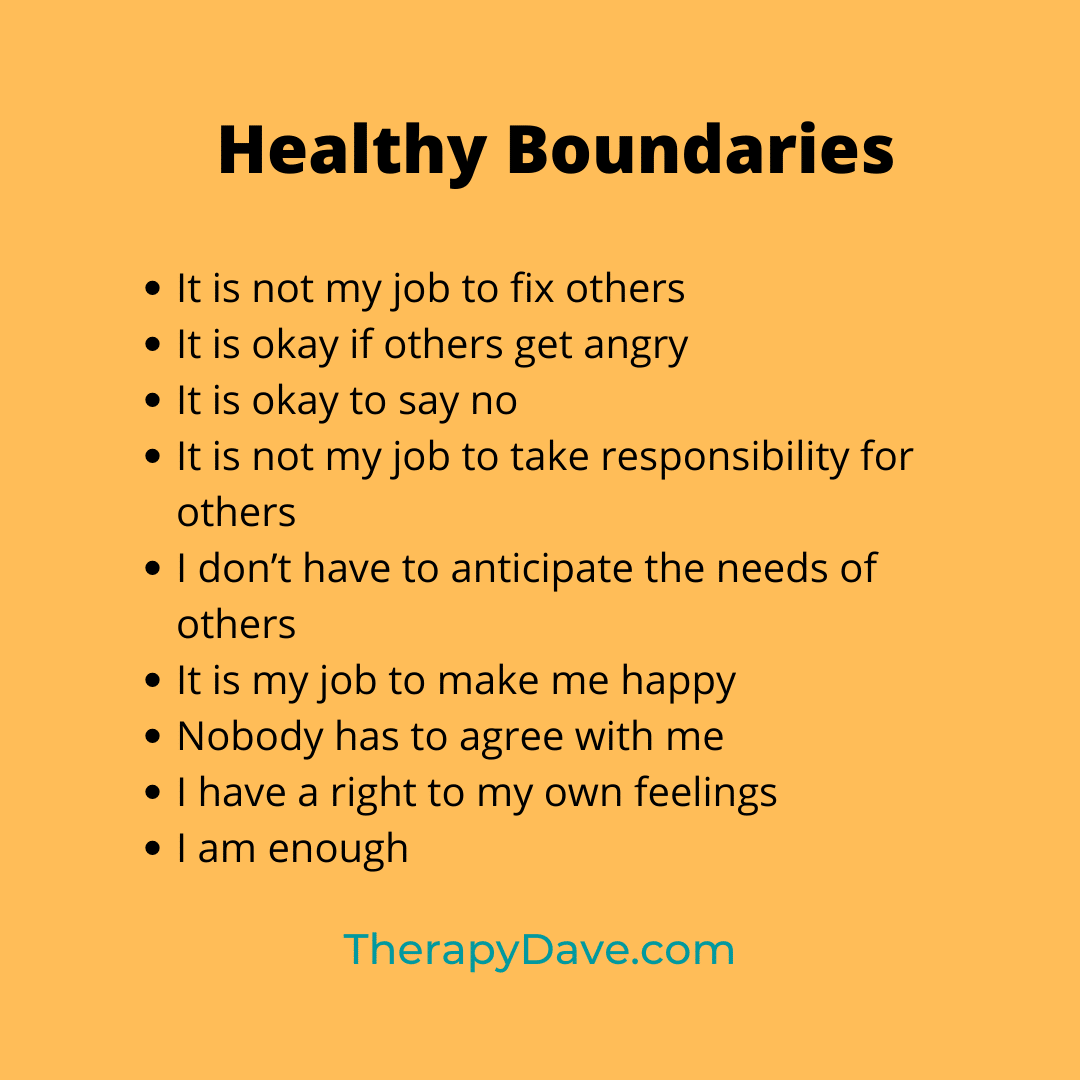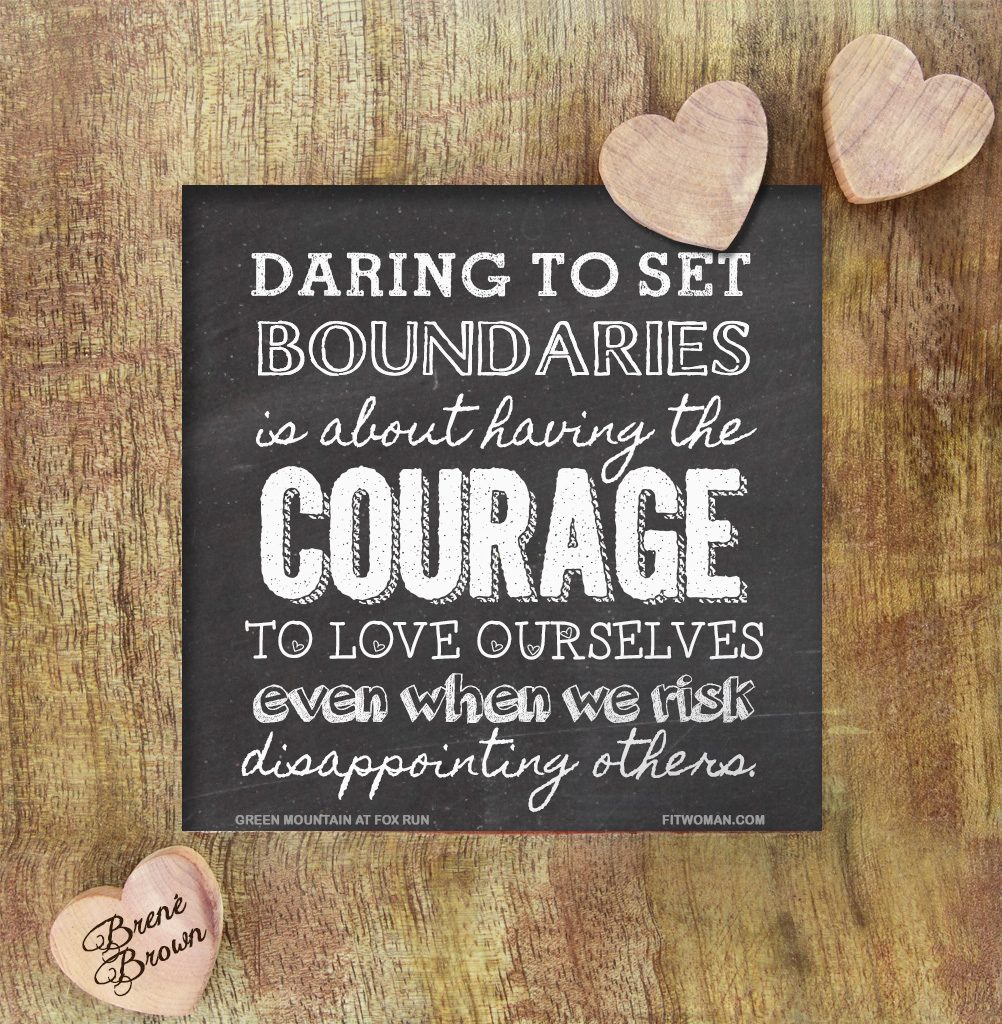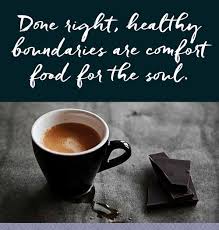Word-Of-the-Week #911: Boundaries
January 20, 2022 by Susan Clarke · Comments Off on Word-Of-the-Week #911: Boundaries
Boundaries – the limits you define in relationship to someone or to something.
Have you ever felt taken advantage of? How comfortable are you saying no to someone?
This week features excerpts from “This Is What It Looks Like to Set Personal and Emotional Boundaries. We all need to set them—here’s what that means and how to do it for mental well-being,” by Elizabeth Yuko at Real Simple.
“Think back to social studies or geography class in elementary school. Your teacher probably showed you a map and explained that certain types of lines were used to show boundaries between states and countries. Sometimes there would be a natural feature (often a river) that would divide one territory from another, but for the most part, the lines we see on the map were not visible in real life. And yet, even though we can’t see the boundaries, people accept that they’re there and understand how far they can go before crossing into other territory.
Boundaries are your way of letting other people know how far they can go with you when it comes to things like emotional support and labor, seeking your help or advice, or even how frequently you’re expected to get in touch.
Most of us were never trained in how to do it and foster healthy relationships in our personal lives. To help you get a better understanding of personal and emotional boundaries, including how to set them and stick to them, here’s some (solicited) advice from trained professionals.
What it means to ‘set boundaries’
“Boundaries are the separations that humans need—mentally, emotionally, and physically—to feel safe, valued, and respected,” says Carla Marie Manly, PhD, a clinical psychologist in Sonoma County, Calif. and author of Joy From Fear and Date Smart.
- It means verbalizing what impacts your comfort levels.
Ultimately, boundaries speak to what we identify as making us comfortable or uncomfortable, says Leela R. Magavi, MD, a psychiatrist and the regional medical director of Community Psychiatry and MindPath Care Centers. And this often involves using verbal strategies. “Individuals could use succinct, clear phrases to address and clarify their comfort level and needs,” she continues. “For example, [during COVID] a person could respectfully ask loved ones to wear their masks, stand further away from them and each other, or wash their hands. This practice at home may ease any discomfort when conversing with neighbors and members of the community.”
- It means learning how and when to say “no.”
Another crucial—but difficult—part of setting boundaries involves learning how to say “no” to others. “Many times, we feel that we owe others a dissertation-level response to why we cannot do this task, go to this event, etc.,” says Melissa Flint, PsyD, a certified clinical trauma provider and associate professor of clinical psychology at Midwestern University in Arizona. “The fact of the matter is a good boundary is an explanation in and of itself. ‘I’m quite sorry, but I cannot commit to working on that project over the weekend. I appreciate you thinking of me and having confidence in me, but not this time!’ is a perfectly adequate response.”
- It means being honest and transparent.
But making a conscious decision to set certain boundaries isn’t enough: you must also communicate those boundaries to the people they involve. “Setting boundaries also includes letting others know what they are—not expecting others to have a crystal ball and just know what you want or do not want,” Flint says.
- It means knowing how to expand—or constrict—the boundaries we set.
It’s also worth noting that a person with healthy boundaries is able to adjust their boundaries depending on the situation to allow for the appropriate level of connection, says Manly. “In practice, we consciously and unconsciously use boundaries to let others know what is acceptable or appropriate,” she explains. “When our boundaries are too permeable, we might tend to let people take advantage of us or accept abusive treatment. When our boundaries are too rigid, we might behave in highly defended ways to keep respectful, loving people at a distance.”
Why setting emotional boundaries is important for our mental well-being
Given that boundaries help us feel safer and more comfortable, it makes sense that they come up so frequently in therapy: They can have a major impact on our mental well-being. “Our emotional boundaries are important because they give us the personal space—emotional, mental, physical, or otherwise—we need in a given situation,” Manly explains. “When our emotional boundaries are respected, we feel valued, honored, and safe. Boundaries can be healing; boundaries can help one not feel taken advantage of.” And while maintaining boundaries can be difficult, it increases self-compassion and self-esteem by allowing people to prioritize their own voice and needs, Dr. Magavi explains.
But when our emotional boundaries aren’t respected, it may leave us feeling overwhelmed or bullied, or anxious. Not only that, but if our boundaries are chronically disrespected, the ongoing feelings of despair and powerlessness can trigger chronic anxiety, depression, and even trauma,” Manly says. “On an instinctual level, we may feel like caged animals who are at the mercy of threatening perpetrators when our boundaries are disrespected.”
Additionally, boundaries are vital, Manly says, because they create the foundation for healthy relationships with the self and with others. “When healthy boundaries are not present, people can be left feeling angry or sad due to interactions that create a sense of being taken advantage of, devalued, unappreciated, or bullied,” she explains.”
This week’s focus is on boundaries. Do you feel safe, valued, and respected at home and at work? How comfortable is it for you to verbalize how you want to be treated? Would you like to have more healthy relationships?
I LOVE feedback! Join my Facebook community on my FUN-damentals Fan Page.
Word-Of-the-Week #841: Boundaries
September 17, 2020 by Susan Clarke · Comments Off on Word-Of-the-Week #841: Boundaries
Boundaries – the limits you define in relationship to someone or to something.
How easy is it for you to set boundaries? Did you make any commitments to help family members, friends, or neighbors at the beginning of the pandemic?
This week features excerpts from the NY Times by Julie Fingersh, “How to Set Pandemic Boundaries for Relatives. You’d do anything for them in a crisis, but the crisis isn’t going away. Here’s how to get your life back.” Setting boundaries is important for a healthy personal and work life!
“When pandemic-related shutdowns started, many people rushed to the rescue of their loved ones. They rallied to meet an extraordinary situation and extended themselves in deep and loving ways. They welcomed home adult children with open arms. They jumped to babysit for their grandkids. They volunteered to shop for neighbors and elderly relatives.
“At first, I thought, this is going to be great,” said Nancy Graham of Plainfield, Ill., about sheltering in place with her husband and their three adult children. “I bought puzzles. I bought stuff to make candles. I was like, let’s watch a documentary a week! Let’s learn something!”
Five months in?
“It’s awful,” said Ms. Graham, a real estate agent. “It’s been years since we’ve all been under the same roof for more than a week. I want to kill them, they want to kill each other, and my husband hides in his office.”
Indeed, with no end in sight, many people are wearing down. How long can they keep this up? Can they dial back their level of commitment, be it a pledge of time, money or emotional support? And why is it all so hard?
“As a social species, we have this powerful, powerful need for emotional closeness,” said Dr. Michael Kerr, a psychiatrist and the author of “Bowen Theory’s Secrets: Revealing the Hidden Life of Families,” based on the research of Dr. Murray Bowen, who viewed the family as an emotional unit. “And at the same time, we are allergic to too much of it. Therein lies the dilemma.”
- Creating healthy boundaries is the antidote.
“People are afraid to set boundaries, because they think it risks the relationship,” said Karen C.L. Anderson, author of “Difficult Mothers, Adult Daughters: A Guide For Separation, Liberation & Inspiration” and a life coach specializing in family boundaries.
“When you want to say ‘no,’ to a loved one, you’re afraid that they’re going to make that ‘no’ mean that you’re a bad mother or grandparent or friend. You figure, I’m just going to say ‘yes,’ so I don’t have to feel guilty later,” she said.
“Boundaries create a context for the preservation of love and peace,” said John Townsend, a psychologist who is the co-author of the Christian-themed book “Boundaries: When to Say Yes, How to Say No to Take Control of Your Life” and host of the “Dr. Townsend Live” show on Crowdcast.
“If you don’t have boundaries, you’ve got chaos,” he said. “Boundaries create an organized structure that people can go, ‘I can live with this. I can tolerate this. I can feel peaceful and still love people.’”
For many people, that’s a lot more easily said than done.
- Renegotiate commitments.
Many people made promises to loved ones back in March, not realizing how long the pandemic might last. How can you create a new normal where your own needs are part of the equation?
The first step, according to Ms. Anderson, is to realize that it’s OK that your needs have changed. “We can always renegotiate our boundaries,” she said. “Just because we’ve agreed to something in one moment doesn’t mean we’ve agreed to it for life. Remind yourself that you get to change your mind.”
- Tell the truth, then let go.
“All you can do is be truthful about what you need going forward,” Ms. Anderson said. “And ask yourself, ‘Do I want my kids and grandkids to love me because I do something I don’t want to do for them? Or do I want them to love me because I’m honest and I’m being myself?’”
Re-establishing boundaries might not be easy, but the rewards can be rich. “Boundaries done right help people be more clear and more intimate, because there’s not the unspoken expectation, like, ‘of course you’re going to keep doing this because you’re my mother and I need you to do it,’” Ms. Anderson said.
“When you can have the conversation without that baggage, you have the space to see each other as fuller human beings, not just the roles you play. It also helps you get to an outcome based on what’s really best for both of you.”
So how do you let go if things don’t go well, despite your best efforts?
“It’s OK to be upset,” Ms. Anderson said. “Tolerating uncomfortable feelings builds emotional resilience. And standing in our truth is hard, but it’s the key to honest relationships. It’s also the key to creating healthy boundaries.”
This week’s focus is on boundaries. Do you feel a need to dial back some commitments you have made? Does that make you feel guilty? How comfortable would it be to tell the truth and renegotiate commitments?
I LOVE feedback! Join my Facebook community on my FUN-damentals Fan Page.
Word-Of-the-Week #712: Boundaries
March 29, 2018 by Susan Clarke · Comments Off on Word-Of-the-Week #712: Boundaries
Boundaries – the limits you define in relationship to someone or to something.
How easy is it for you to leave work? How often do you take work home with you? Do you feel guilty if you’re not the first person (or last) at the office?
This Inc. article from Marla Tabaka seemed like the perfect follow up to last week’s Unplug. “Out of office (really) How to leave work behind at the end of the day.”
“You can turn off your computer at the end of the day, but shutting down work-related thoughts isn’t as simple as pushing a button.
An inability to disengage from work has its consequences, including high stress levels, lowered productivity and damaged relationships. It also puts you in danger of being seen as a very dull person.
A client recently told me that her older sister confessed to missing their little sister because all she talks about is work. Where’s the fun in that?
Working from a home office for about 20 years has forced me to find little tricks to successfully separate my work and personal life. These simple steps can make a big difference.
- View your disengagement as productive
Setting goals is important and setting boundaries gives us the energy and clarity to achieve them.
I recently bumped into an acquaintance in a coffee shop who rambled on about why it was OK that he chose to sleep an extra 30 minutes instead of racing to the office. Obviously, he was trying to talk himself into believing it, and I was happy to be a sounding board. But this is a silly thing to feel guilty about. How can a person be productive when he or she is exhausted?
Study after study shows the importance of resting the mind and body. You’ll be clear-headed and productive when you nurture your relationships, eat right and get enough sleep.
You are achieving something important when you take yourself out of work mode.
- End the day on a good note
Leaving work with an incomplete project or a problem weighing on your mind makes it difficult to disconnect. To close out your day, send a signal to your brain telling it to switch to something pleasant and let the problems rest until you intentionally switch back into work mode.
Make a phone call to thank or compliment someone, scratch some things off your to-do list or jot down a couple of positive things about your day. Sometimes it’s a stretch to find the good in a particularly difficult day, but believe me, it’s there.
- Straighten up your office
When I walk out of a messy office, it leaves me with a nagging feeling that I’ve left something undone. Why carry frustration into the next segment of your day? My daily clean-up ritual signals the end of the day for me, and I walk away with a sense of accomplishment. Being organized also saves an immense amount of time, once again adding to increased productivity.
- Connect with someone outside of work
When you call a friend, your brain switches gears, setting you up to move into your personal agenda. Make the conversation about the friend rather than your work, especially if you’ve had a stressful day. Instead of opening up an opportunity for negativity, avoid asking the standard, “How was your day?” and ask about the good or exciting things that happened since you last spoke.”
This week’s focus is on boundaries. Would your family or friends say “all you ever talk about is work”? How often do you leave work on a positive note? What can you do to “switch gears” so you can move into your personal agenda quicker?
I LOVE feedback! Join my Facebook community on my FUN-damentals Fan Page.




